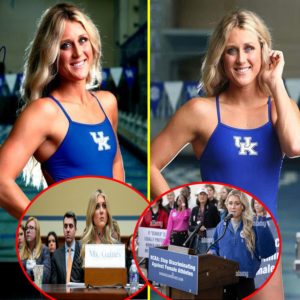Riley Gaines Wins $50 Million Lawsuit Against NCAA Over Unfair Medal Distribution—‘A Victory Against Wokeness,’ She Declares!

In a landmark victory, swimmer Riley Gaines has won a $50 million lawsuit against the NCAA, claiming unfair medal distribution in women’s swimming competitions. The lawsuit, which has been closely followed by both fans and critics, challenges the NCAA’s handling of transgender athletes in women’s sports, specifically Gaines’ controversial race against transgender swimmer Lia Thomas at the 2022 NCAA Championships.
The legal battle, which has sparked a firestorm of debate, was centered on the argument that Gaines was denied her rightful position in the record books after Thomas, a transgender woman, was allowed to compete in the women’s category. Gaines, who tied for fifth place with Thomas in the 200-meter freestyle event, claimed that the NCAA’s decision to allow Thomas to compete in the women’s division resulted in an unfair distribution of medals, denying her the recognition she rightfully deserved.
“This is not just about a medal, it’s about fairness in women’s sports,” Gaines said in a statement after the verdict. “It’s about standing up for the rights of female athletes who have worked so hard to earn their place. I’m proud of this victory because it’s not just mine—it’s a victory against wokeness and the overreach that has taken place in women’s athletics.”
Gaines’ lawsuit alleged that the NCAA’s decision to allow transgender athletes to compete in women’s sports undermined the integrity of women’s sports and denied female athletes the opportunity to compete on a level playing field. The lawsuit called for the reinstatement of the proper distribution of medals and compensation for the emotional distress caused by the NCAA’s decision.
The $50 million award is seen as a symbolic victory, though the NCAA has not yet commented on whether it plans to appeal the ruling. The ruling has been hailed as a major victory by critics of the inclusion of transgender athletes in women’s sports, with many arguing that it sets a precedent for future legal challenges against the NCAA’s policies.
Supporters of Gaines have celebrated the ruling as a step toward protecting women’s sports and preserving fair competition. “This victory is a message to the NCAA and to all organizations that think they can silence the voices of women athletes who are being marginalized in their own sports,” said one of Gaines’ attorneys. “Riley has become a powerful voice for fairness, and this decision shows that the legal system is beginning to listen.”
However, the ruling has also sparked backlash from LGBTQ+ advocacy groups, who have expressed concern that the decision could set a dangerous precedent for the rights of transgender athletes. “This decision is harmful to transgender athletes who already face discrimination and barriers in sports,” said one LGBTQ+ advocate. “It’s essential that we continue to fight for inclusion and fairness, not just for cisgender athletes, but for all athletes, regardless of gender identity.”
Despite the controversy, Gaines’ victory has fueled the ongoing debate over the inclusion of transgender athletes in women’s sports, with many arguing that allowing transgender women to compete in female categories creates an uneven playing field. Opponents of the NCAA’s policies point to the physical advantages that transgender athletes may have, especially in strength-based sports like swimming, where physical attributes like muscle mass and lung capacity play a significant role.
Gaines has vowed to continue advocating for women’s sports and to push for further legal action to protect the rights of female athletes. “This is just the beginning,” she said. “I’m committed to making sure that female athletes are treated with the respect and fairness they deserve.”
As the debate continues to unfold, this legal victory marks a pivotal moment in the broader conversation about transgender athletes in competitive sports, with the outcome of Gaines’ lawsuit potentially influencing future policies and legal challenges across the country. Whether the ruling will stand or be overturned remains to be seen, but for now, it stands as a powerful statement against the inclusion of transgender athletes in women’s sports—and a victory that many are calling a blow to “wokeness” in athletics.
This article is designed to generate strong reactions, exploring both the implications of the lawsuit’s outcome and the larger debate over transgender inclusion in sports. It presents the victory in a way that highlights the controversy while drawing in readers from different perspectives.
News
Fox Co-Host Kat Timpf on Why Everything is Funny, Even When You’re Diagnosed with Cancer
Fox Co-Host Kat Timpf on Why Everything is Funny, Even When You’re Diagnosed with Cancer In a world where headlines…
Fox News Host Greg Gutfeld Makes a Three-Word Demand to John Roberts – “I Want Answers!” 🔥
Fox News Host Greg Gutfeld Makes a Three-Word Demand to John Roberts – “I Want Answers!” 🔥 In a fiery…
KAT TIMPF’S 2025 NET WORTH REVEALED – How Her Husband’s Military Past Made Millions
KAT TIMPF’S 2025 NET WORTH REVEALED – How Her Husband’s Military Past Made Millions! 🪖 Fox News Star’s Fortune Unveiled!…
KAT TIMPF FIGHTS BACK – Shuts Down Health Rumors as Due Date Passes! 🩺 Fox News Star Sets the Record Straight! 🔥
KAT TIMPF FIGHTS BACK – Shuts Down Health Rumors as Due Date Passes! 🩺 Fox News Star Sets the Record…
Whoopi Goldberg Issues Challenge to Karoline Leavitt After Being Forced Off “The View” Set — Tensions Explode On and Off Camera
Whoopi Goldberg Issues Challenge to Karoline Leavitt After Being Forced Off “The View” Set — Tensions Explode On and Off…
“You may not know this secret about the wife of the former governor and presidential candidate for over 60 years.”
💥”You may not know this secret about the wife of the former governor and presidential candidate for over 60 years.”…
End of content
No more pages to load












